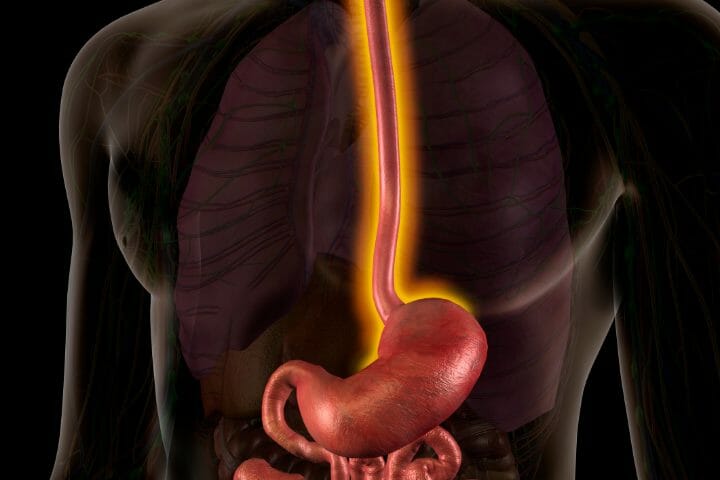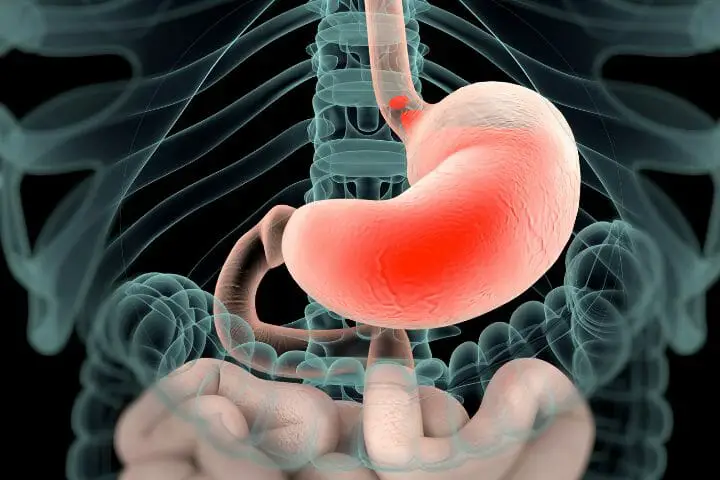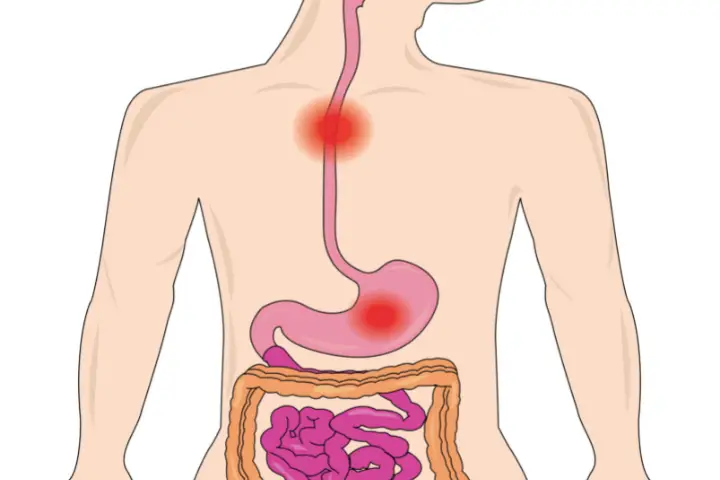Studies show that 1.8% of gastritis patients have Barretts Esophagus. But can you get disability for Barretts Esophagus? Is it a severe enough disease to consider it as a disability? What causes it, and how is it related to GERD?
Contents
As per John Hopkins Medicine, GERD affects over 30 million people in North America.
Barretts Esophagus is most often associated with GERD. In this article, we will discuss Barretts Esophagus and other medical conditions associated with the stomach such as GERD and IBS.
Not all medical conditions are considered disabilities, and we will look into information about the same in this article. The ADAAA fairly recently changed the definition of disability, leaving employers unsure how to evaluate whether an employee is now disabled.
We will also answer if one can get a disability for Barretts Esophagus. However, please note that what you read here is neither legal advice nor health advice. Your healthcare practitioner and disability lawyer are the best and most reliable source of information for these purposes.

What Is Barretts Esophagus?
Barretts Esophagus is a condition in which the flat pink esophageal lining, the swallowing tube that connects the mouth to the stomach, thickens and becomes red because of acid reflux.
One must understand the reasons behind the acid reflux occurring in the first place when stomach acid runs back into the esophagus and gastroesophageal reflux disease (GERD) (esophagus).
What is GERD?
Gastroesophageal reflux disease (GERD) is a disorder in which the acidic contents in your stomach seep back up into your esophagus, the tube that connects your throat to your stomach.
Acid backwash then travels up your esophagus, through your throat, and into your mouth, leaving a sour taste. This acid reflux or backwash can irritate a person’s flat pink esophageal lining.
Acid reflux is not rare and affects many people from time to time. Low severity Acid reflux that happens two times a week or severe acid reflux that happens not more than once a week is termed as GERD.

What are the symptoms of GERD?
The Medical University of South Carolina describes gastroesophageal reflux as one of the most frequent esophageal diseases. This commonly manifests as heartburn or regurgitation in 20% of the population.
Chest pain, cough, or hoarseness are additional symptoms seen in some patients. Regardless it is strongly advised for individuals suffering from chronic and recurrent GERD symptoms to get a correct diagnosis and receive the most effective treatment possible.
You might also like to read: Can You Get Disability For Thyroid Disease?
How do I know if I have GERD?
The Cleveland Clinic mentions that almost everyone experiences acid reflux at some point. It’s very natural to experience acid reflux and heartburn sometimes. One can usually manage the discomfort of GERD with lifestyle adjustments and OTC medicines.
However, some GERD patients might need stronger medication or even surgery to alleviate their symptoms. The most common symptom of GERD is frequent heartburn; individuals who experience discomfort and burning pain that may move towards the abdomen or chest two or more times a week are likely symptoms of GERD.
Other symptoms include regurgitation, which causes a bitter or sour-tasting liquid that is essentially acidic in nature to back up your throat or mouth. Some may also experience difficulty swallowing, coughing, wheezing, and chest pain, especially while lying down at night for sleep, weight loss for unknown reasons, burping, bloating, etc.

Is GERD a Disability?
Someone dealing with GERD may be able to qualify for receiving benefits from the Social Security Administration if their GERD cannot be dealt with available treatments and has led to complications. The SSI (Supplemental Security Income) or Social Security Disability (SSD) can help GERD patients meet their daily expenses.

Is GERD covered under ADA?
The ADA is the Americans with Disabilities Act. It was signed into law in 1990. The ADA website describes it as a law which makes discrimination against the disabled as illegal in all aspects of life, including schools, at work, in transity, and all other public venues.
The law’s goal is to provide people with disabilities with the same rights and opportunities as everyone else. The symptoms of gastroesophageal reflux disease may not be enough to qualify for Social Security disability benefits, especially if an individual can manage them with lifestyle changes and medication.
One must understand that the ADA does not list down an exclusive list of all medical conditions that will be considered disabilities. Instead, the ADA contains a broad definition of disability that everyone must meet.
You might also like to read: Can You Get Disability For Stomach Problems?
How Are GERD And Barrett’s Esophagus Related?
Now that we have covered GERD and its acceptance as a disability, let us look at how Barretts Esophagus related to GERD and whether the connection can help you get a disability claim passed.

Is GERD the same as Barrett’s esophagus?
Barrett’s esophagus is a complication of gastroesophageal reflux disease (GERD). According to John Hopkin’s Medicine, Barrett’s esophagus affects about 5% of patients with chronic GERD esophageal inflammation.
Men are more likely than women to get this disorder, and Caucasians are more likely than African Americans to develop it. The average age at the time of diagnosis is usually 55.
WebMD mentions that Barrett’s Esophagus is more common in persons with acid reflux (GERD), although it can also occur in those who don’t have GERD. The normal tissue lining the esophagus (the tube that transports food from the mouth to the stomach) transforms into tissue resembling the intestine lining in Barrett’s esophagus.
How is Barrett’s Esophagus treated?
Endoscopy is generally employed to determine whether an individual is dealing with this medical condition. Your doctor will take a sample of tissue from your esophagus.
The Mayo Clinic explains that doctors can determine the degree of alteration by examining the biopsied tissue. An endoscope is passed down an individual’s throat to check for evidence of esophageal tissue change. Healthy esophageal tissue appears pale and shiny. Barrett’s esophagus tissue is crimson and velvety in appearance.
You might also like to read: Can You Get Disability For Crohn’s Disease?
Can You Get Disability For Barrett’s esophagus?
In line with the aforementioned, which outlines that Barrett’s Esophagus is a potentially serious complication of GERD, an individual’s symptoms and the intensity of the complication will determine whether the same will be considered a disability.
The severity of the conditions will vary from individual to individual, and hence it is not possible to chalk out a generalized answer to this. The symptoms of gastroesophageal reflux disease may not be enough to qualify for Social Security disability benefits, especially if one can manage them with lifestyle changes and medication.
Suppose an individual is dealing with an extreme GERD, which can also have consequences like cancer or acute malnutrition, making it difficult for the individual to work full-time.
In that case, they are far more likely to qualify for disability benefits than an individual whose work proficiency is not affected to such an extent.

Does Barrett’s Esophagus Turn Into Cancer?
The Mayo Clinic mentions that people with Barrett’s Esophagus do have cancer risk. Esophageal cancers may develop in patients with Barrett’s Esophagus. However, the risk is fairly small, even in patients with esophageal precancerous cells.
The ASGE explains in detail that this type of cancer is of two types which are Squamous cell cancer and esophageal adenocarcinoma. While esophageal adenocarcinoma attacks the cells altered by Barretts Esophagus, Squamous cell cancer will affect only the normal cells.
Squamous cell carcinoma is more common among African Americans. Other risk factors include smoking cigarettes, eating fatty foods and consuming too much alcohol.
This sort of cancer is not becoming more common. The other malignancy, esophageal adenocarcinoma, is more common among Caucasians and individuals with gastroesophageal reflux disease (GERD).
This cancer is becoming more common. Most occurrences of esophageal adenocarcinoma, according to doctors, start in Barrett’s tissue.
An article authored by medical experts mentions that Barrett’s Esophagus cancer advancement is infrequent in any given patient; studies of Barrett’s esophagus patients show that only about 0.5 percent of individuals develop esophageal cancer each year.
Furthermore, those with Barrett’s esophagus appear to live roughly the same as those without the disease. As a flipside, individuals suffering from Barrett’s esophagus tend to die of other causes before cancer develops in their bodies.
Based on cohort studies made to study the relationship between Barrett’s Esophagus and life expectancy in patients of the same, experts concluded that men, patients with longer Barrett esophagus segments, and patients with dysplasia have an increased risk of developing cancer.
At baseline, individuals with low-grade dysplasia had a 3-fold increased risk of cancer progression in a given Dutch dataset comprising 42,207 patients. Patients with high-grade dysplasia had a very high risk of developing cancer. For patients with low-grade dysplasia it might be possible to destroy the abnormal tissue with specific forms of therapy, whereas for those with high-grade dysplasia it might need more intensive forms of eradication therapy.

Frequently Asked Questions
1. Can you get disability for hemorrhoids?
The Disability Benefits Help mentions that the IBS is currently not included in the list of SSA’s listings. The problem may be severe in some people, and those are exceptional circumstances.
An individual may get approved for benefits if they can defend their medical condition with strong reasoning. In such cases, it is strongly advised to seek advice from an experienced social security lawyer who may help you build a strong enough case.
2. Can depression cause acid reflux?
GERD has been known to significantly negatively impact an individual’s quality of life and ability to work and even disrupt their everyday activities.
An article in the National Library of Medicine mentions that Gastroesophageal Reflux Disease (GERD) affects a person’s health, social and daily functioning, and emotional and physical activities. It is also known to interfere with a person’s sleep cycle and work.
The cross-sectional study involved 258 patients who were diagnosed with GERD. Among these, 112 had chest pain issues. Researchers used a Hospital anxiety/ depression scale for assessing symptoms of depression and anxiety in these patients.
This study showed that 107 patients faced depression, 89 dealt with anxiety, and 70 had depression and anxiety. The authors hence concluded that cases of depression and anxiety were seen in preponderant GERD patients, particularly those who had chest pain concerns.
3. Is Irritable Bowel Syndrome associated with GERD?
Irritable Bowel Syndrome is another common health problem reportedly experienced by one in four people in the United States. Healthline describes IBS as a common gastrointestinal disorder that affects the colon.
Patients experiencing the same complain that abdominal pain, cramps, bloating, constipation, diarrhoea, and gas are common symptoms. Urgent bowel motions or a sense of incomplete evacuation are other IBS symptoms.
4. Are GER and GERD the same thing?
The National Institute of Diabetes and Digestive and Kidney Diseases describes the former that is gastroesophageal reflux (GER), a condition where the contents of your stomach return up into your esophagus. On the other hand, Gastroesophageal reflux disease (GERD) is a more serious and long-term illness in which GER creates recurring symptoms or consequences over time.
5. How to determine whether a person has a disability under the Americans with Disabilities Act Amendment Act?
A disability is defined as an impairment that significantly limits a key life activity. When deciding whether an employee has a disability, one must essentially consider a basic list of factors:
Is th employee suffering from any impairment?
If the answer to the aforementioned is yes, then does the same effect a key life activity?
Thirdly, does the individual’s impairment significantly affect their key life activity?
Remember the following:
Get the diagnosis and move on to make the accommodation if an impairment is on the EEOC’s list of conditions. If your name isn’t on the list:
Consider how restricted the employee would be if no safeguards were in place.
Consider the employee’s limitations when the impairment is present.
Consider the circumstance, mode, or duration in which an employee performs a major life function if necessary.
Lastly, her recommendation to the readers is that if they are in a position of doubt and cannot emphatically answer the abovementioned questions, they should apply for accommodation.
A Few Final Words
Lastly, we advise you to regularly maintain your regular endoscopic appointments and seek professional advice from a certified healthcare expert.
Please share your thoughts with us in the comments section. Should you have any queries or article requests, please share them. Do consider sharing this write-up with acquaintances who are likely to reap the benefit.

